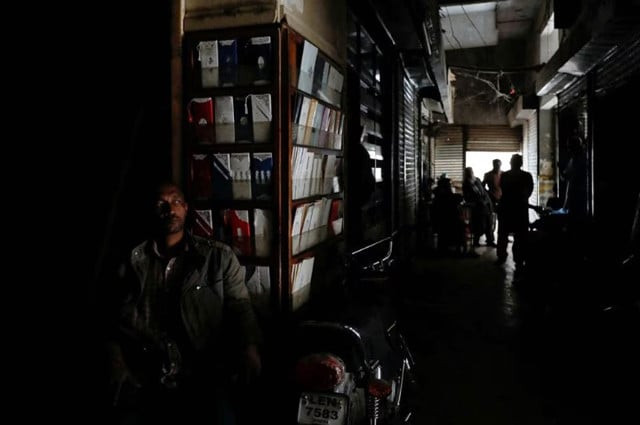Power breakdown source traced to ‘Guddu station’
Petroleum minister made convener of four-member inquiry body

The government has formed a four-member committed on Thursday to probe into the causes of a massive power breakdown that left millions of citizens without power on Monday.
According to a notification issued by the Power Division, Minister of State for Petroleum Dr Musadik Malik would be the convener of the body.
Other members included Irfan Ali, former federal power secretary; Akhtar Hussain Mayo, former CEO, Quaid-e-Azam Thermal Power Limited; Prof Dr Tahir Nadeem Malik, Chairperson of the Electrical Engineering Department, Hi-Tech University, Taxila.
The committee would present a comprehensive report into the causes/reasons behind the breakthrough in a week to Prime Minister Shehbaz Sharif in a week, the notification added.
Meanwhile, an inquiry committee of the National Transmission and Dispatch Company (NTDC) has identified a trip in power transmission lines from the Guddu power station for the countrywide power breakdown.
The failure to boot up the system eventually shut down the entire transmission system.
A fact-finding report detailing the causes of the outage and restoration process, submitted by the NTDC on Wednesday, found that the duration of the longest breakdown in the country's history was 20 hours.
According to the report, the nationwide breakdown of electricity, which occurred at 7:34 am on January 23, was caused by the tripping of 500 kV transmission lines originating from the Guddu power station.
As a result, over 23 power plants were shut down and 11,356 megawatts of electricity production was lost due to the closure of the plants.
As for restoration, the report said the efforts to fix the fault began at 9:39pm and continued till 3:21pm on January 24 when the power was fully restored.
Commenting on the report, energy experts chalked up the debacle to a lack of timely safety measures while adding that the recovery process was delayed due to the incompetence of the system operator.
They regretted that the electricity transmission system in the country was being run on an ad hoc basis as the system operator was without a regular managing director for the last four years.
The contract of the MD had expired on January 6.
Similarly, sources said that internal bickering within the energy ministry was also partly to be blamed for the failure as “two senior officials of the ministry were at odds with each other which undermined attempts to appoint NTDC’s managing director”.
According to energy experts, nationwide breakdowns are taking place in quick succession, the main reason being grouping and political appointments in the power sector.
Instead of qualified engineers, the power sector is being pushed towards destruction with the appointments of complete novices in major positions.
An internal government document reviewed by Reuters showed that Pakistan's generators produced more power than was required on Monday, causing voltage fluctuations that culminated in a system collapse that plunged 220 million people into darkness,.
The blackout was triggered by the power grid's frequency rising to 50.75 hertz (hz) early on Monday, causing severe voltage fluctuations in transmission lines in the south, according to the internal note.
A frequency over 50hz indicates the power generated exceeds demand, while a frequency under 50hz points to supply falling short of demand. Grid operators attempt to keep the frequency of the grid stable at 50hz, with deviations over 0.05hz typically considered abnormal.
The frequency of the grid was already 50.30hz moments before the incident, according to the note. The severe frequency fluctuations in the transmission lines caused it to trip, Sajjad Akthar, general manager at state-run National Transmission and Distribution Company (NTDC) wrote in the note drafted on Tuesday.
"Transmission lines tripped, which resulted in isolation of north and south system," Akthar said in the note. Pakistan's energy ministry did not respond to a request for comment. The note did not mention why supply overshot demand.\
(With additional input from Reuters)



















COMMENTS
Comments are moderated and generally will be posted if they are on-topic and not abusive.
For more information, please see our Comments FAQ